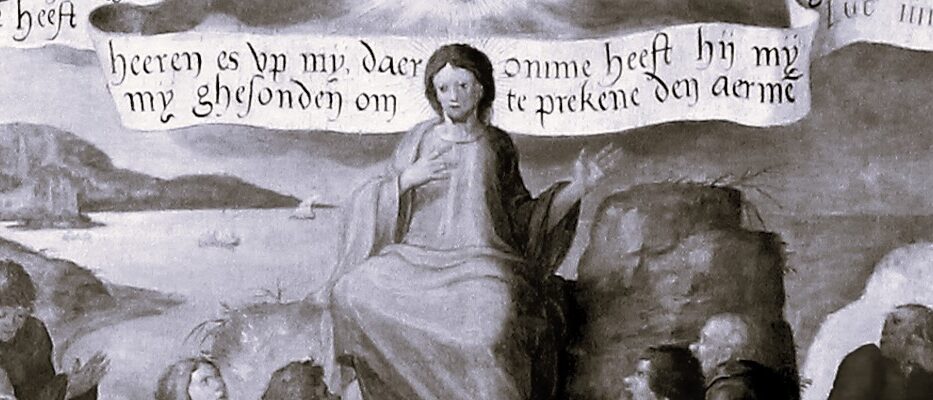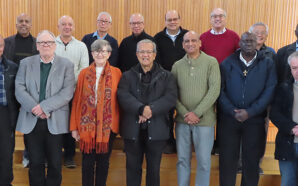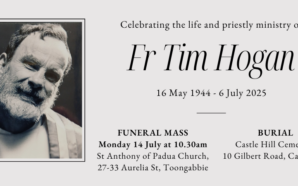Homily for the 6th Sunday in Ordinary Time 2025
16 February 2025
Readings: Jeremiah 17:5-8; Psalm 1; 1 Corinthians 15:12, 16-20; Luke 6:17, 20-26
About 40 years ago, I was meeting with an Aboriginal group at Eulo 70 km west of Cunnamulla in far south-west Queensland. We were standing in the dried up river bed of the Paroo River. It was very hot, and very dry. But there was a gentle breeze and the River Red Gums looked resplendent. Despite the drought like conditions and despite the woes of the local Aboriginal community, I had a feeling of deep inner peace evocative of today’s first reading from Jeremiah: ‘A blessing on the person who puts their trust in the Lord, with the Lord for their hope’. That person is ‘like a tree’: ‘when the heat comes it feels no alarm, its foliage stays green; it has no worries in a year of drought, and never ceases to bear fruit’.
Listen to the full homily on SoundCloud
Today’s readings, which are popular at funerals, call us back to the trust and hope we profess as Christians. Paul does not mess around with the Corinthians. He makes it very clear: ‘If our hope in Christ has been for this life only, we are the most unfortunate of people.’ Our trust and hope in God are grounded both in our present life with all its challenges and vicissitudes and in the life to come. Believing that we are created to be part of both worlds, we are able to maintain hope and trust here and now even when things are grim. This belief is not an excuse for failing to take action for justice and peace here and now. It is a motivation to take action here and now for justice and peace and for those who are suffering most – the poor, the hungry, the weeping and the despised. It is a warning to us when we are self-satisfied with our present reality, as if it is all there is – enjoying our riches, having our fill, laughing and partying, and having the world speak well of us.
That’s why the Beatitudes in today’s gospel make so much sense at funerals, perhaps even more sense than on Sundays in Ordinary Time.
With those who are grieving a tragic loss, we want to affirm communally and liturgically our trust and hope in God. In Luke’s account, there are four blessings followed by four woes: Blessed are you who are poor, you who are hungry now, you who weep now, and you when people hate you. Alas for you who are self-satisfied, thinking you have it all here and now. The smug and self-satisfied see no need for trust and hope in God; it’s at best an optional extra. We count as blessed those, who at the end of life, were seeking more, more than this world could give – more for themselves and especially for others whose needs are so great. Having passionately sought these things, they are to be satisfied and joyful, for their reward will be great in heaven. We celebrate the trust and hope of the deceased who, despite the odds, is like one of those red gums in the Paroo River during drought.
Some translations of these beatitudes simply state that the poor, the hungry, the weeping and the despised are ‘happy’. But that’s not quite it at all. The scripture scholars are agreed that the Greek word makarioi is best rendered with the traditional ‘blessed’. Scripture scholar M. Dennis Hamm SJ says, ‘This is not a description of a psychological state, like “happy”, though that dimension is not excluded. The meaning of makarios, rather, is the positive state of being in right relationship with God, no matter how one feels’.[1]
Unlike Matthew with his nine beatitudes, Luke posits four beatitudes alongside four ‘woe’ sayings. Luke likes to present the either/or choice. Think only of his unique presentation of the crucifixion of Jesus: ‘one of the criminals crucified with him will rebuke him, and the other will accept him in faith. Some bystanders mock; others go home striking their breasts in grief and repentance.’[2]
At this Eucharist and in the week to come, each of us has a choice. We face the question: am I blessed, or am I cursed? We are being called into right relationship with our God in this life and in the life to come. We know that we cannot be living in right relationship with our God unless we be living in right relationship with our neighbour, seeking forgiveness and reconciliation when we are not and when we cannot.
Pope Francis took the extraordinary step of writing to the US Catholic Bishops during the week, joining issue with President Trump’s planned mass deportation of undocumented migrants and replying to Catholic Vice-President Vance’s attempt to justify the government’s actions. Francis wrote:
Christian love is not a concentric expansion of interests that little by little extend to other persons and groups. In other words: the human person is not a mere individual, relatively expansive, with some philanthropic feelings! The human person is a subject with dignity who, through the constitutive relationship with all, especially with the poorest, can gradually mature in his identity and vocation. The true ordo amoris that must be promoted is that which we discover by meditating constantly on the parable of the “Good Samaritan” (cf. Lk 10:25-37), that is, by meditating on the love that builds a fraternity open to all, without exception.[3]
‘A fraternity open to all, without exception’! We all fall short there, both as individuals and as citizens of a nation state. That’s why we all need to trust and hope in the Lord regardless of our level of self-satisfaction, fulfilment and achievement. And before we let ourselves off the hook as Australians assuring ourselves that we would never take Trump-like options, let’s remember that the pope’s challenging words also have some application to our Australian laws and methods for dealing with undocumented migrants. Some of the new laws passed at the end of last year with the support of both the government and the Opposition are quite repugnant.[4]
Pope Francis concluded his letter asking that Mary of Guadalupe ‘who knew how to reconcile peoples when they were at enmity, grant us all to meet again as brothers and sisters, within her embrace, and thus take a step forward in the construction of a society that is more fraternal, inclusive and respectful of the dignity of all.’
Happy are they who hope in the Lord.
Happy indeed is the person
who follows not the counsel of the wicked;
nor lingers in the way of sinners
nor sits in the company of scorners,
but whose delight is the law of the Lord
and who ponders the Lord’s law day and night.
Happy are they who hope in the Lord.
That person is like a tree that is planted
beside the flowing waters,
that yields its fruit in due season
and whose leaves shall never fade;
and all that she does shall prosper.
Happy are they who hope in the Lord.
[1] M Dennis Hamm, ‘Luke’, The Paulist Biblical Commentary, Paulist Press , 2018, 1031, 1054.
[2] Ibid.
[3] https://www.vatican.va/content/francesco/en/letters/2025/documents/20250210-lettera-vescovi-usa.html.
[4] See https://www.eurekastreet.com.au/article/offshore-people-dumping-by-a-spooked-government.
Fr Frank Brennan SJ is serving as part of a Jesuit team of priests working within a new configuration of the Toowong, St Lucia and Indooroopilly parishes in the Archdiocese of Brisbane. Frank Brennan SJ is Adjunct Professor of the Thomas More Law School at ACU and is a former CEO of Catholic Social Services Australia (CSSA). Fr Frank’s latest book is An Indigenous Voice to Parliament: Considering a Constitutional Bridge, Garratt Publishing, 2023 and his new book is ‘Lessons from Our Failure to Build a Constitutional Bridge in the 2023 Referendum’ (Connor Court, 2024).








